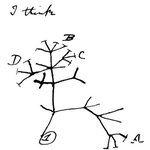
Charles Darwin often gets lumped together with Karl Marx in an effort to ascribe the ills of the 20th century to Darwin's ideas about evolution.
But science writer Matt Ridley explains why Darwin's ideas are closer to Adam Smith's than they are to Marx's. He argues that selection can account for the appearance of design not just in biology, but also in the economy and technology. And in fact, the idea of natural selection is an intellectual decendant of Adam Smith's invisible hand:
Locke and Newton begat Hume and Voltaire who begat Hutcheson and Smith who begat Malthus and Ricardo who begat…
